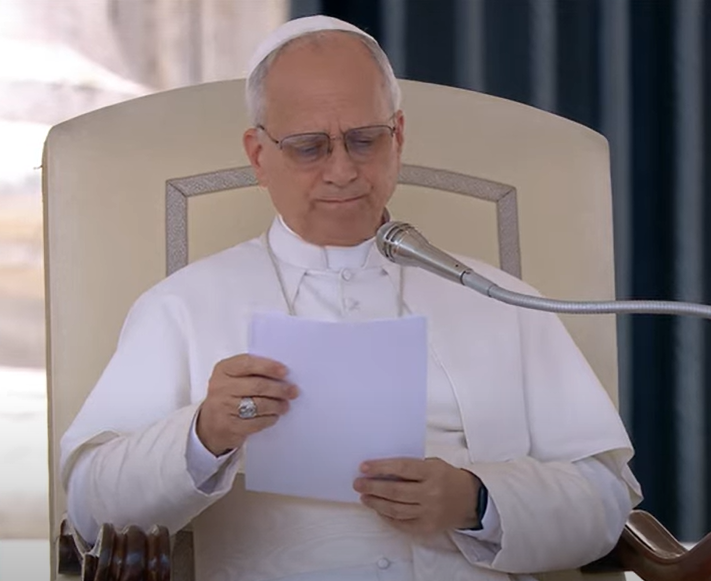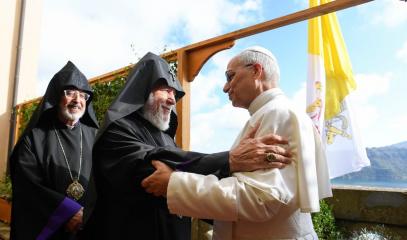On Gaza, pope pleads ‘Thou shalt not kill’, expresses closeness to the Palestinian people
From St Peter's Square, Leo XIV spoke about the emptying of Gaza City under “unacceptable conditions”, stressing that “every person always has an inviolable dignity,” and that “international humanitarian law” must be upheld. The pontiff also issued a message for religious leaders gathered in Kazakhstan. “The future we envision” is one “of peace, fraternity and solidarity,” he said. Yesterday, he met with Karekin II, Catholicos of the Armenian Church. In his Jubilee catechesis, Leo explained that, “God works in depth, in the slow time of trust.”
Vatican City (AsiaNews) – The world needs "a dawn of peace and justice,” said Pope Leo this morning, speaking to the thousands of faithful gathered in St Peter's Square for the Wednesday general audience. "I invite you all to join in my heartfelt prayer," he added.
The pontiff turned his thoughts first “to the Palestinian people in Gaza, who continue to live in fear and to survive in unacceptable conditions, forcibly displaced – once again – from their own lands.”
In recent days, Israel has begun its ground operation in Gaza City, taking control of over 40 per cent of the area with thousands of Palestinians fleeing; meanwhile, the UN has defined Israel's actions as “genocide”.
In light of the situation, the pope reiterated his "profound closeness" to the Palestinians of Gaza who cannot find peace. As soon as he mentioned the Palestinian people, a spontaneous round of applause broke out in the square.
Looking on, his face dark and sombre, Leo said, “Before God Almighty, who commanded “Thou shalt not kill”, and in the sight of all of human history, every person always has an inviolable dignity, to be respected and upheld.”
In his renewed plea today, uttered from the basilica's parvis, the pontiff called for “a ceasefire, the release of hostages, and a negotiated diplomatic solution, fully respecting international humanitarian law.”
Today Pope Leo XIV also sent a message to the participants in the Eighth Congress of Leaders of World and Traditional Religions, currently underway (until tomorrow) at the Palace of Independence in Astana, Kazakhstan. Patriarch Kirill of Moscow is one of the attendees.
The theme of the meeting is “Dialogue of Religions: Synergy for the Future”, inspired by the “common desire to bring healing to our fractured and wounded world,” reads the papal message.
“Every authentic religious impulse fosters dialogue and cooperation,” as well as “a profound sense of solidarity, “ which “is synergy in action: the lived expression of loving our neighbor as ourselves on a global scale.” This becomes “an invitation to embrace diversity,” he adds.
The “‘synergy for the future’ is not an abstract slogan but a living reality,” Leo writes. This was true for the “historic gathering of religious leaders for prayer in Assisi in 1986, convened by Pope John Paul II,” which “demonstrated that there can be no peace among nations without peace among religions.”
With the Document on Human Fraternity for World Peace and Living Together, signed in Abu Dhabi in 2019 by Pope Francis and Ahmad Al-Tayyeb, Grand Imam of Al-Azhar, “offered a clear blueprint for how religious synergy can advance global peace and coexistence.”
To this end, “The future we envision – a future of peace, fraternity and solidarity – calls for the commitment of all hands and all hearts” who must “bear witness to the truth that faith unites more than it divides.”
Indeed, “When religious leaders stand together in defence of society’s most vulnerable, [they] join in planting trees to care for our common home, or raise a united voice in support of human dignity”.
Synergy, thus, represents “a powerful sign of hope for all humanity”, a “synergy for peace” that “‘is unarmed and disarming, humble and persevering,’” one that is “always seeking charity and drawing close to those who suffer”, Leo said echoing his first “Urbi et Orbi” blessing on 8 May.
At present, the pontiff is also engaged in important ecumenical meetings. Yesterday, he met at Castel Gandolfo with Karekin II, Catholicos of the Armenian Apostolic Church since 1999. Peace was one of the topics of the meeting.
The patriarch spoke to the pope about the plight of ethnic Armenians from the Republic of Artsakh, a state never recognised by the international community in the historically disputed region of Nagorno-Karabakh, annexed by Azerbaijan in 2023 after a violent attack that sparked the flight of more than 100,000 people who found refuge in Armenia.
Artsakh and the peace agreement signed by Armenia with Azerbaijan are one of the main reasons for the conflict pitting the Armenian Church against the Armenian government of Prime Minister Nikol Pashinyan.
Karekin II met with John Paul II in Rome in 2000, then again in Armenia in 2001 when the Polish pope travelled to the country to mark the 1,700th anniversary of Christianity becoming Armenia’s state religion.
The Catholicos also met with Benedict XVI and Francis, with the latter visiting the world's first Christian country in 2016. In subsequent years, the two leaders shared calls for peace after Azerbaijan’s attacks on Nagorno-Karabakh.
Today, Feast of Saint Robert Bellarmine, the pope’s secular name day, Leo read the catechesis this morning in St Peter’s Square, part of the Jubilee cycle, on the theme of “Jesus Christ our hope” centred on “the mystery of Holy Saturday” and the death of Jesus.
Jesus’s “absence” in the tomb “is not emptiness: it is expectation, a restrained fullness, a promise kept in the dark,” Leo explained. It is “a silence laden with meaning”. If we understand this, we realise that “God works in depth, in the slow time of trust,” he added.
“Christian hope,” the pontiff stressed, “is not born in noise, but in the silence of an expectation filled with love. It is not the offspring of euphoria, but of trustful abandonment.”








.png)










